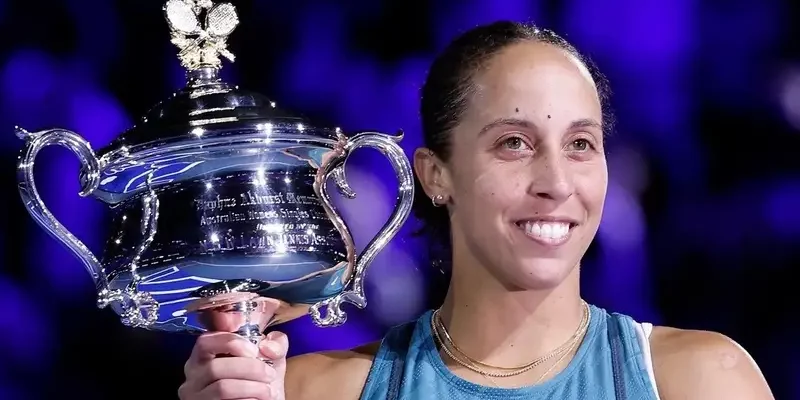INDIAN WELLS, Calif. — When Madison Keys was 10 years old, her family moved from their small Illinois town to Florida so she could train at Chris Evert’s tennis academy. The expectations were significant, and her dream was to win a Grand Slam.
Keys quickly reached the top levels of tennis. At 16, she debuted in a major tournament at the US Open and won her first match.
However, despite the anticipation and her own ambition, it took 46 major tournament appearances for Keys to achieve her long-held dream. These appearances included both successful runs and early exits, including a final at the 2017 US Open. Finally, in January, after an impressive run where she defeated the world No. 1 Aryna Sabalenka in the final, Keys won the Australian Open.
Keys returned home with the trophy, feeling elated, keeping it close during three flights, not wanting to lose what she had worked so hard to achieve. After media appearances in New York, she returned home with her husband and coach Bjorn Fratangelo and was immediately faced with the question: What now?
She spent the next three days relaxing at home.
‘It was emotionally exhausting,’ Keys, 30, told ESPN this week before the BNP Paribas Open. ‘You experience the highest highs, and then you come home, and it’s over. I was trying to recover. It was an incredible achievement, I was very happy, but the emotional aftermath was a bit surprising.’
Keys, now ranked No. 5 in the world, isn’t the first to experience this post-Slam letdown. In fact, she had been forewarned.
‘It’s funny how many former players reached out to me and said, ‘The existential crisis is normal,” Keys said.
Several players told her that her first practice back would be difficult, and it was, in her words, ‘tragic.’ More importantly, they told her she would likely need to rethink her goals. Now that she had achieved her primary goal, what would motivate her going forward?
Dominic Thiem, a former world No. 3 who won his major title at the 2020 US Open, spoke about the impact of achieving this goal.
‘After the US Open, I felt euphoric,’ Thiem said in a 2021 interview. ‘The results were still good, and I reached the final at the ATP Finals in London. But during the preparation for this season, I fell into a hole… I had spent 15 years chasing this major goal without looking left or right. And then I achieved it.’
Ashleigh Barty, a three-time major champion, echoed Thiem’s feelings while promoting her book, ‘My Dream Time.’
‘Winning Wimbledon was my biggest career goal,’ Barty said in an interview. ‘But after achieving it in June 2021, my passion faded.’
In her book, she wrote about her feelings: ‘I don’t know what I’m playing for anymore. I think I’m done. I have nothing left, no spark.’
Barty never regained that passion and, despite winning the Australian Open in 2022, retired shortly after as world No. 1 at the age of 25.
Determined to avoid a similar path, Keys took proactive steps. She started seeing a psychologist a year prior and continued weekly sessions after returning from Australia. Keys discussed her post-victory emotions, noting it felt different than expected. She compared it to an amplified version of the day after her wedding. ‘It’s like you plan and build up to something, then you wake up the next day, and it’s over.’
Talking through these feelings has been helpful, she said, and she is proud of her vulnerability and honesty. It has helped her gain perspective during what she anticipated would be the happiest time of her life.
Instead of immediately returning to competition, Keys allowed herself some time off. While her peers competed in events in Doha and Dubai, Keys stayed at her Orlando home, training at the USTA National Campus. Being around younger American players during this time allowed her to appreciate her victory, which is difficult in tennis with weekly tournaments. It also provided an unexpected confidence boost.
‘The younger players used to wear visors, but now they said they wear hats because of me,’ Keys said. ‘I thought, ‘Gen Z likes me!”
Being well-liked by her fellow players has always been important to Keys. While some players avoid friendships to maintain a competitive edge, Keys values being friendly and supportive in the locker room.
The reaction to her Australian Open victory highlighted her peers’ respect. Current stars like Coco Gauff, Jessica Pegula, and Sloane Stephens, and legends like Serena Williams, all congratulated her on social media.
Taylor Fritz, currently ranked No. 4 in the world and the top American man, told ESPN, ‘I was genuinely so happy for her. It’s been a while since I was that happy for someone achieving something… She reached the US Open final years ago, and it’s amazing to see this happen for her now. She really deserves it.’
For Keys, this kind of response is very meaningful.
‘I’ve always wanted to be known as a good person first,’ Keys said. ‘I’ve always rejected the idea that nice people can’t be successful. If winning a Grand Slam meant changing who I am and becoming meaner, it wouldn’t be worth it because I don’t want to change to achieve something that, realistically, no one will care about in five years.’
‘So, the support I received felt validating and showed me, ‘Maybe I am a good person.’ That’s really important to me, almost more special than winning.’
Keys returns to competition this week at the BNP Paribas Open, about six weeks after her major win. As the No. 5 seed, she had a first-round bye and will play Anastasia Potapova on Saturday. More attention will be on her than ever.
She knows expectations are high but also knows her capabilities and isn’t putting excessive pressure on herself. Keys is still figuring out her new goals and is giving herself time to do so. Before the Australian Open, she had accepted she might never win a major, a realization her psychologist helped her with. While things have changed, she is approaching this new chapter with the same mindset.
‘It’s like, ‘I did it once, maybe I can do it again,’ and the goal is to win another Slam,’ Keys said. ‘But realistically, there are many great players, and it’s hard to win one, so it might not happen again. And that’s okay.’
‘For now, my goal is to manage my expectations honestly, continue focusing on what worked well, and enjoy the process because January in Australia was some of the most fun I’ve ever had on a tennis court.’






